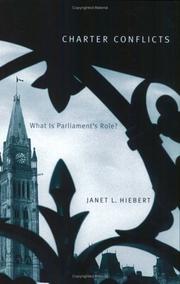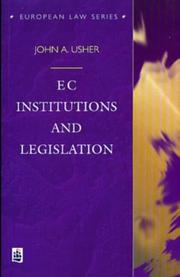| Listing 1 - 10 of 73 | << page >> |
Sort by
|
Book
ISBN: 0191741159 1283705958 019164594X 0191645931 Year: 2013 Publisher: Oxford : Oxford University Press,
Abstract | Keywords | Export | Availability | Bookmark
 Loading...
Loading...Choose an application
- Reference Manager
- EndNote
- RefWorks (Direct export to RefWorks)
Are legislatures able to form and act on intentions? The question matters because the interpretation of statutes is often thought to centre on the intention of the legislature and because the way in which the legislature acts is relevant to the authority it does or should enjoy. Many scholars argue that legislative intent is a fiction: the legislative assembly is a large, diverse group rather than a single person and it seems a mystery how the intentions of the individuallegislators might somehow add up to a coherent group intention.This book argues that in enacting a statute the well-formed l
Legislative power. --- Power, Legislative --- Constitutional law --- Implied powers (Constitutional law) --- Judicial review --- Separation of powers
Book
ISBN: 0300206569 9780300206562 9780300179910 030017991X 9780300179910 Year: 2014 Publisher: New Haven Yale University Press
Abstract | Keywords | Export | Availability | Bookmark
 Loading...
Loading...Choose an application
- Reference Manager
- EndNote
- RefWorks (Direct export to RefWorks)
In this timely and important work, eminent political theorist John Dunn argues that democracy is not synonymous with good government. The author explores the labyrinthine reality behind the basic concept of democracy, demonstrating how the political system that people in the West generally view as straightforward and obvious is, in fact, deeply unclear and, in many cases, dysfunctional. Consisting of four thought-provoking lectures, Dunn's book sketches the path by which democracy became the only form of government with moral legitimacy, analyzes the contradictions and pitfalls of modern American democracy, and challenges the academic world to take responsibility for giving the world a more coherent understanding of this widely misrepresented political institution. Suggesting that the supposedly ideal marriage of liberal economics with liberal democracy can neither ensure its continuance nor even address the problems of contemporary life, this courageous analysis attempts to show how we came to be so gripped by democracy's spell and why we must now learn to break it.
Democracy --- Legislative power. --- Power, Legislative --- Constitutional law --- Implied powers (Constitutional law) --- Judicial review --- Separation of powers --- Philosophy. --- Legislative power --- Philosophy
Book
ISBN: 2760526488 276052647X Year: 2010 Publisher: Québec, [Quebećbec] : Presses de l'Université du Québec,
Abstract | Keywords | Export | Availability | Bookmark
 Loading...
Loading...Choose an application
- Reference Manager
- EndNote
- RefWorks (Direct export to RefWorks)
Depuis les élections fédérales de 2004, trois gouvernements minoritaires se sont succédé au Parlement du Canada. En 2007, l’Assemblée nationale du Québec s’est également retrouvée, pour la deuxième fois de son histoire seulement, en situation minoritaire. Ces gouvernements ont-ils été aussi efficaces que les gouvernements majoritaires qui les ont précédés ? À l’aide de huit indicateurs quantitatifs, tels que le taux de réussite des projets de loi émanant du gouvernement ou la proportion de lois adoptées provenant de l’opposition, Pier-Luc Migneault compare l’efficacité législative des gouvernements minoritaires à celle des gouvernements majoritaires. Il en profite pour exposer les concepts et modèles généraux des législatures minoritaires et en dresser l’historique. Il aborde enfin l’attitude des politiciens à l’égard de ces législatures, questionnant au passage le modèle monopartisan qui prédomine au Canada, contrairement aux autres pays où des gouvernements de coalition sont formés en cas de configuration minoritaire. Tout acteur de la scène politique, de même que tout observateur de celle-ci, qu’il soit journaliste, étudiant, enseignant ou simple citoyen, sera intéressé par cet ouvrage qui comble un vide dans la littérature de langue française.
Legislative power --- Coalition governments --- Cabinet system --- Coalitions --- Power, Legislative --- Constitutional law --- Implied powers (Constitutional law) --- Judicial review --- Separation of powers
Book
ISBN: 0191682020 9780191682025 Year: 1993 Publisher: Oxford : Clarendon,
Abstract | Keywords | Export | Availability | Bookmark
 Loading...
Loading...Choose an application
- Reference Manager
- EndNote
- RefWorks (Direct export to RefWorks)
Rejecting a purely formal concept of the rule of law, Allan argues that public law should more fully and openly reflect the principles of liberty and justice which constitute the underlying point and substance of the rule of law. The connection between law and justice is ultimately secured by the primary role of the individual conscience in making judgements about what the law requires.
Constitutional law --- Rule of law --- Legislative power --- Power, Legislative --- Implied powers (Constitutional law) --- Judicial review --- Separation of powers --- Supremacy of law --- Administrative law

ISBN: 1282860607 9786612860607 0773570373 9780773570375 0773523995 9780773523999 0773524088 9780773524088 Year: 2002 Publisher: Montreal
Abstract | Keywords | Export | Availability | Bookmark
 Loading...
Loading...Choose an application
- Reference Manager
- EndNote
- RefWorks (Direct export to RefWorks)
Although the Canadian Charter of Rights and Freedoms is twenty years old, little is known about how it affects those who wield power, what influence it has on legislative decisions, or to what extent the government believes it should be constrained by Charter concerns. For most laws Parliament has the final word on how social policy is balanced against protected rights. Thus the extent to which legislation is sensitive towards rights depends on how those who develop, propose, and assess policy view the Charter. How influential are governmental legal advisors? How risk averse or risk tolerant are government ministers when pursuing legislative goals that may result in Charter challenges? How capable is Parliament in requiring government to justify and explain legislative choices that may impair rights? In Charter Conflicts Janet Hiebert examines these questions while analyzing the Charter's influence on controversial legislative decisions such as social benefits for lesbians and gay men, the regulation of tobacco advertising, the rules of evidence for sexual assault trials, the use of DNA for law enforcement purposes, and the rules for police searches of private residences. She questions the broadly held assumption that only courts are capable of respecting rights, arguing that Parliament shares responsibility with the judiciary for resolving Charter conflicts. She views the Charter's significance less in terms of the judiciary overruling Parliament than in the incentives and pressures it provides for public and political officials to satisfy themselves that legislation is consistent with protected rights.
Civil rights --- Legislative power --- Power, Legislative --- Constitutional law --- Implied powers (Constitutional law) --- Judicial review --- Separation of powers --- Canada. --- Droits de l'homme --- Pouvoir législatif
Book
ISBN: 0197599729 0197599761 0197599753 Year: 2021 Publisher: New York, New York : Oxford University Press,
Abstract | Keywords | Export | Availability | Bookmark
 Loading...
Loading...Choose an application
- Reference Manager
- EndNote
- RefWorks (Direct export to RefWorks)
In Life in the Middle, Neilan S. Chaturvedi argues that the belief in the powerful, pivotal moderate neglects their electoral circumstances and overestimates their legislative power. Using unique interview data with legislative directors, retired United States Senators, and data compiled from the Congressional Record, Chaturvedi shows that, because of their precarious electoral circumstances, moderate senators must avoid active participation on bills and pushing controversial legislation. The book also demonstrates that mainstream concerns about polarization and its negative effects of increased gridlock and ideological legislation are true.
Political parties --- Legislative power --- Political culture --- History. --- Culture --- Political science --- Power, Legislative --- Constitutional law --- Implied powers (Constitutional law) --- Judicial review --- Separation of powers
Book
ISBN: 9065446907 Year: 1993 Publisher: Deventer Kluwer law and taxation publ.
Abstract | Keywords | Export | Availability | Bookmark
 Loading...
Loading...Choose an application
- Reference Manager
- EndNote
- RefWorks (Direct export to RefWorks)
European law --- 341.17 EC --- Legislation --- -Legislative power --- -Power, Legislative --- Constitutional law --- Implied powers (Constitutional law) --- Judicial review --- Legislative bodies --- Separation of powers --- State governments --- Legislative process --- Law --- Legislative power --- Europese Gemeenschappen--EC --- -Europese Gemeenschappen--EC --- 341.17 EC Europese Gemeenschappen--EC --- Power, Legislative

ISBN: 3525824394 9783525824399 Year: 1987 Volume: 157 Publisher: Goettingen : Vandenhoeck & Ruprecht,
Abstract | Keywords | Export | Availability | Bookmark
 Loading...
Loading...Choose an application
- Reference Manager
- EndNote
- RefWorks (Direct export to RefWorks)
--1985 --- --Göttingen --- --Legislation --- -Legislative power --- -Power, Legislative --- Legislative process --- Legislation --- Legislative power --- Law --- Power, Legislative --- Constitutional law --- Implied powers (Constitutional law) --- Judicial review --- Separation of powers --- History&delete& --- Congresses --- Conferences - Meetings --- Histoire du droit --- --Colloque --- History --- Congresses. --- Roman law --- Philosophy --- Colloque --- Legislation - History - Congresses --- Legislative power - History - Congresses --- Göttingen --- Droit romain --- Droit --- Histoire --- Philosophie

ISBN: 0582277507 9780582277502 Year: 1998 Publisher: London Longman
Abstract | Keywords | Export | Availability | Bookmark
 Loading...
Loading...Choose an application
- Reference Manager
- EndNote
- RefWorks (Direct export to RefWorks)
European law --- Legislative power --- Law --- Pouvoir législatif --- Droit --- Legislation --- -Legislative power --- -Power, Legislative --- Constitutional law --- Implied powers (Constitutional law) --- Judicial review --- Legislative bodies --- Separation of powers --- State governments --- Legislative process --- -Legislation --- Pouvoir législatif
Book
ISBN: 9026835396 9789026835391 Year: 1999 Volume: 63 Publisher: Deventer Kluwer
Abstract | Keywords | Export | Availability | Bookmark
 Loading...
Loading...Choose an application
- Reference Manager
- EndNote
- RefWorks (Direct export to RefWorks)
Legislation --- Legislative power --- -Legislative power --- -341.17 EUR --- Power, Legislative --- Constitutional law --- Implied powers (Constitutional law) --- Judicial review --- Legislative bodies --- Separation of powers --- State governments --- Legislative process --- Law --- 341.17 EUR --- Legislation - European Union countries. --- Legislative power - European Union countries.
| Listing 1 - 10 of 73 | << page >> |
Sort by
|

 Search
Search Feedback
Feedback About UniCat
About UniCat  Help
Help News
News